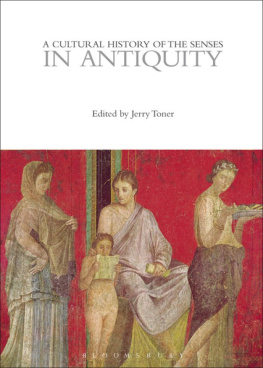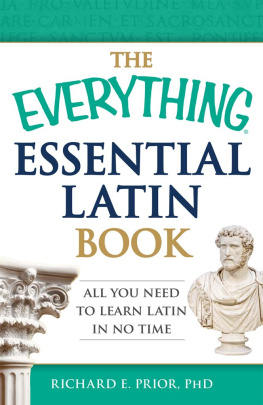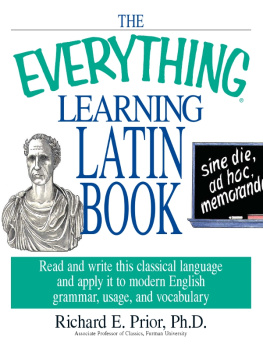Jerry Toner - Latin Key Words: The Basic 2000 Word Vocabulary Arranged by Frequency. Learn Latin Quickly and Easily.
Here you can read online Jerry Toner - Latin Key Words: The Basic 2000 Word Vocabulary Arranged by Frequency. Learn Latin Quickly and Easily. full text of the book (entire story) in english for free. Download pdf and epub, get meaning, cover and reviews about this ebook. year: 2017, publisher: The Oleander Press, genre: Detective and thriller. Description of the work, (preface) as well as reviews are available. Best literature library LitArk.com created for fans of good reading and offers a wide selection of genres:
Romance novel
Science fiction
Adventure
Detective
Science
History
Home and family
Prose
Art
Politics
Computer
Non-fiction
Religion
Business
Children
Humor
Choose a favorite category and find really read worthwhile books. Enjoy immersion in the world of imagination, feel the emotions of the characters or learn something new for yourself, make an fascinating discovery.
- Book:Latin Key Words: The Basic 2000 Word Vocabulary Arranged by Frequency. Learn Latin Quickly and Easily.
- Author:
- Publisher:The Oleander Press
- Genre:
- Year:2017
- Rating:3 / 5
- Favourites:Add to favourites
- Your mark:
Latin Key Words: The Basic 2000 Word Vocabulary Arranged by Frequency. Learn Latin Quickly and Easily.: summary, description and annotation
We offer to read an annotation, description, summary or preface (depends on what the author of the book "Latin Key Words: The Basic 2000 Word Vocabulary Arranged by Frequency. Learn Latin Quickly and Easily." wrote himself). If you haven't found the necessary information about the book — write in the comments, we will try to find it.
Quickly Master Basic Latin by Building a Practical Vocabulary Fast!
* New for 2017 Completely revised and updated
* First 100 words provides 40% common usage
* A simple, fast, proven way to learn Latin with ease
* Easy units - your confidence grows as your vocabulary grows
* Created by Cambridge University Classics Fellow Dr Jerry Toner
Latin Key Words provides an easy route to mastering excellent basic Latin. Easy-to-learn Unit Structure gets you the words you need to know quickly and easily.
One hundred easy-to-master units of 20 words each.
Learn Latin quickly and simply.
These words are the essential foundation stones on which you intuitively build your language framework:
The first hundred words account for 40% of common usage and the first thousand for 68%. The full 2000 key words represent 75% of all Latin words in a corpus of nearly two million.
Learn the vocabulary in Latin Key Words and you are three quarters of the way to mastering the entire corpus of Latin texts.
Also provides an all-in-one basic Latin-English dictionary and an all-in-one basic English-Latin Dictionary.
The perfect aid - to learn Latin by using the simplest, most logical way to pick up a vocabulary of ten thousand words from two thousand.
Latin Key Words presents you with the 2,000 word basic vocabulary ordered by frequency of occurrence - in one hundred simple units.
Ideal for Examinations and University study. Includes the major works of the following authors: Caesar, Catullus, Cicero, Horace, Livy, Ovid, Suetonius, Tacitus, and Virgil.
A simple, fast, proven way to learn Latin with ease.
Jerry Toner: author's other books
Who wrote Latin Key Words: The Basic 2000 Word Vocabulary Arranged by Frequency. Learn Latin Quickly and Easily.? Find out the surname, the name of the author of the book and a list of all author's works by series.













